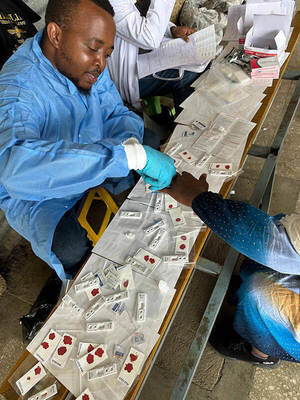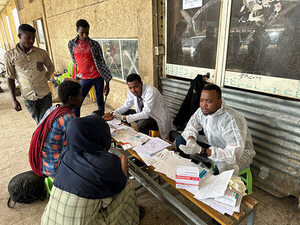Although two hundred years have passed since the development of the first antimalaria treatment and over 140 years since the parasite was seen for the first time under a microscope, malaria remains one of the most critical health problems in Sub-saharan Africa–and numbers are on the rise in the Ethiopian Highlands.
Henry Kamugisha is on a mission to find out why.

A student in the Master of Science in Global Health program at the University of Notre Dame, Kamugisha hopes that innovations in malaria testing will explain why malaria is emerging at increasingly higher numbers in the rugged regions of central Ethiopia. He works with the research team in the lab of Cristian Koepfli, assistant professor in the Department of Biological Sciences, who is developing novel testing methods to identify emerging variants in malaria parasites.
Kamugisha’s passion for studying malaria began in childhood. “Growing up in rural Uganda, I witnessed firsthand the profound impact of disease, how it affects villages and entire communities,” he says. “I want to make sure that even though I could not help my grandmother, who passed away from malaria, I can make sure that I am doing everything I can to prevent the suffering of future generations in my community–that’s why I am blessed to be a part of this program, to be able to contribute to this research.”
Kamugisha’s current research project examines the results of over 900 blood samples he collected during the summer of 2023 in the Gondar Zone of Ethiopia. Working closely with Koepfli’s long-term collaborators from the University of Gondar, he collected the blood samples from people at a bus stop as they traveled from the low country back to the Ethiopian Highlands. While at the bus stop, he tested voluntary participants with rapid diagnostic tests (RDTs) designed to identify positive cases of malaria from two malaria parasites, Plasmodium falciparum, the most common malaria parasite in Sub-saharan Africa, and Plasmodium vivax, which is common in the Horn of Africa.
Even with the announcement of two malaria vaccines in 2021 and 2023 to prevent the disease, there is still much work to be done to treat patients who have contracted malaria. “Sometimes medications don't work because different species of these parasites respond uniquely to treatment regimens,” Kamugisha explains. “For example, healthcare workers may administer a drug that has commonly demonstrated effectiveness in treating Plasmodium falciparum because the patient presents with common symptoms,” he says. “Only later, when the patient is much sicker, do healthcare workers realize the patient has a different type of malaria parasite.” Rapid diagnostic testing can help doctors select the right course of treatment early on.

for indications of malaria
Testing is also helping to solve the mystery of malaria transmission. During his fieldwork, Kamugisha was surprised that although clinicians found a high number of positive malaria cases through RDTs, nearly everyone reported few to no symptoms. Kamugisha is now confirming the infections detected by RDTs by using highly sensitive molecular polymerase chain reaction (PCR) testing in the laboratories at the University of Notre Dame.
“If the RDTs are accurate, we can prove that movement of people from endemic regions to non-endemic regions in the Ethiopian Highlands is contributing to the spread of infections,” he says. Providing this information to public health authorities may improve future intervention options that control the spread of malaria.
Koepfli is optimistic about the outcomes of Kamugisha’s work. “Ethiopia is a malaria-endemic country where isolated regions are experiencing significant challenges. There is a need for passionate researchers with a keen interest in working with the Ethiopian research community to develop innovative ideas together,” he says. “Henry has dedicated an immense amount of time in administering RDTs, and analyzing their results so that we can guide officials on how to reduce transmission and ultimately eliminate malaria for good.”
Kamugisha will continue this research in the University’s doctoral program in biological sciences, which he will begin in the fall of 2024.
Applications for the Master of Science in Global Health program are currently open. “The two-year Master of Science in Global Health is a best-in-class program, designed to train students to be leaders in global health,” says Bernard Nahlen, Director of the Eck Institute for Global Health. “The Eck Institute welcomes all to apply who, like Henry Kamugisha, have a passion for advancing health standards and reducing health disparities for all.”
To learn more about how to apply, please visit the Eck Institute for Global Health website.
Contact:
Christine Grashorn, Communications Specialist
Notre Dame Research / University of Notre Dame
cgrashor@nd.edu / 574.631.4856
research.nd.edu / @UNDResearch
About the Eck Institute for Global Health
The Eck Institute for Global Health (EIGH), an integral part of Notre Dame Research, builds on the University’s historical strength in infectious disease research, including vector-borne diseases, while broadening the interdisciplinary expertise into other key global health areas including maternal, newborn, and child health (MNCH); community health; mental health; nutrition and non-communicable diseases; the environment and health; health analytics and technologies; and health systems and organizations. Our team of interdisciplinary researchers and their students holistically address health disparities around the world. EIGH faculty affiliates recognize health as a fundamental human right and promote research, training, and service to advance health standards for all people, especially those in resource-poor countries who are disproportionately impacted by preventable diseases. The EIGH is training the next generation of global health researchers and leaders through undergraduate, Master of Science in Global Health, doctoral, and postdoctoral programs.